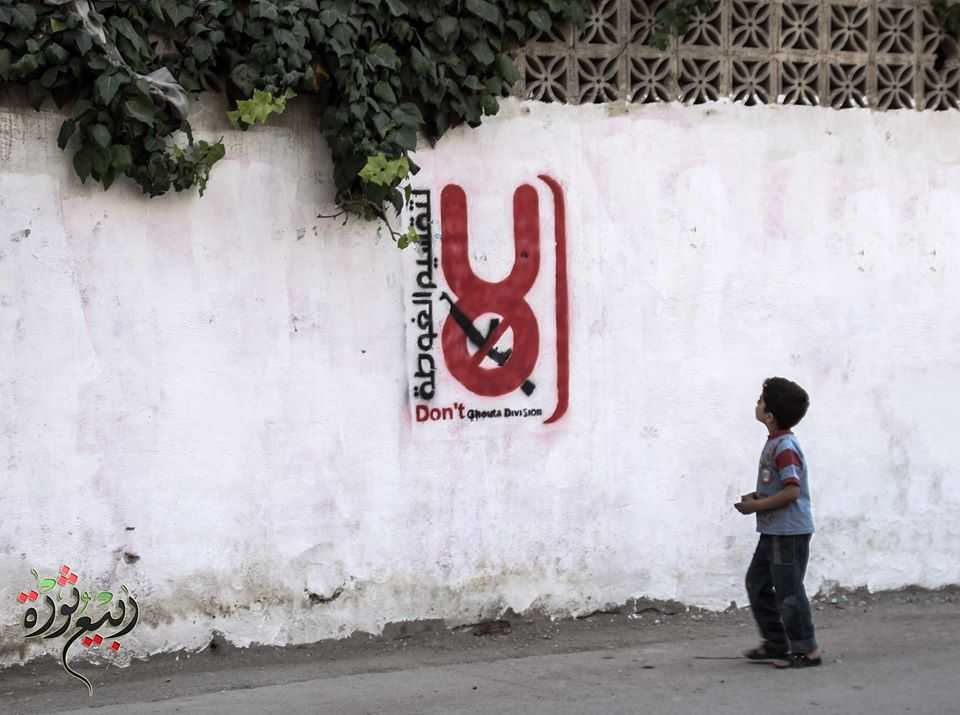East Ghouta infighting over, for now: ‘People are tired of both sides’
AMMAN: One day after a bilateral ceasefire agreement halted 12 […]
10 May 2016
AMMAN: One day after a bilateral ceasefire agreement halted 12 days of rebel infighting between Jaish al-Islam and Failaq a-Rahman in East Ghouta, residents told Syria Direct on Tuesday that although “normal life has returned,” they are “tired of both sides.”
Jaish al-Islam and rival Islamist factions Failaq a-Rahman and Jaish al-Fustat, made up of Jabhat a-Nusra and Fajr al-Ummah, began overtly battling for dominance in multiple towns across the regime-blockaded East Ghouta suburbs on April 28. The infighting followed months of back-and-forth skirmishes, assassination attempts and arrests.
Battles came to a crescendo over the weekend, when Jaish al-Islam stormed and took control of the towns of Misraba and Mudira, both held by Failaq a-Rahman, using tanks. The attack prompted Failaq a-Rahman to accuse JAI of “leading East Ghouta into a sea of blood.”
Two days later, following pressure from religious and civilian leadership in East Ghouta and days of popular protests, leaders of the warring factions agreed to a ceasefire on Monday and formed a seven-man peacemaking committee to settle outstanding conflicts.
As part of the deal, agreed under the auspices of the Unified Judiciary Council in East Ghouta, “we have completely withdrawn from Misraba,” Qais a-Shami, a Jaish al-Islam spokesman told Syria Direct on Tuesday. Control of the town, which is now a neutral area, was turned over to the East Ghouta Free Police.

“Both sides have committed to nonaggression,” Failaq a-Rahman spokesman Wael Alwan told Syria Direct on Monday, pointing to the role of “strong and positive intervention from the civilian institutions in Ghouta” in the agreement.
“When the agreement was signed, there was clear joy on people’s faces,” East Ghouta activist Osama al-Omri told Syria Direct on Tuesday. “Today, normal life returned to East Ghouta.”
Speaking to Syria Direct this week, JAI’s a-Shami and Rahman’s Alwan downplayed ongoing tensions or a power struggle in East Ghouta, and said they were ready to fight alongside each other once more.
“The infighting is not in anybody’s interest,” said a-Shami. “What is happening in Ghouta is not infighting over power and influence. Failaq a-Rahman are our brothers.”
“We are ready to fight with Jaish al-Islam in a single trench, against the Assad regime,” Failaq a-Rahman spokesman Wael Alwan told Syria Direct.
Counting the cost
What did nearly two weeks of fierce infighting cost East Ghouta residents? In addition to multiple civilian casualties, the battles put East Ghouta’s medical system, already struggling under years of blockade, at risk.
“Medical centers cut their hours to an hour and a half a day during the fighting,” East Ghouta activist Ahmad al-Hamdan told Syria Direct on Tuesday.
“There was an attack on some pharmacies and medical centers” in Misraba during JAI’s raid on Saturday, Failaq spokesman Alwan told Syria Direct on Monday.
The Alfajr Development Foundation, a medical aid organization in East Ghouta, accused JAI members of looting one of its pharmacies in Misraba during Saturday’s raid, in an announcement posted online the following day.
“The pharmacy provided medicine to the people of East Ghouta at reduced prices,” read the announcement, which also called on JAI to “return the stolen items and compensate for the damaged contents of the pharmacy.”
Another medical casualty of the rebel power struggle was Dr. Nabeel a-Daas, the last obstetrician and gynecologist in East Ghouta, who was declared clinically dead after being struck by a stray bullet in his Douma home last week. (Ed.: Dr. Nabeel a-Daas died of his injuries on Wednesday, May 11, 2016).
“The loss of the doctor, or of any specialist, in East Ghouta is a great loss that cannot be compensated,” his colleague Iyad Abd a-Rahman told Syria Direct this week.
Whatever the cause may be behind two weeks of bloody and costly infighting between Jaish al-Islam and Failaq a-Rahman, it does not strike civilians as particularly compelling, says Ghouta activist Ahmad al-Hamdan.
“The people are tired of both sides,” says al-Hamdan.







